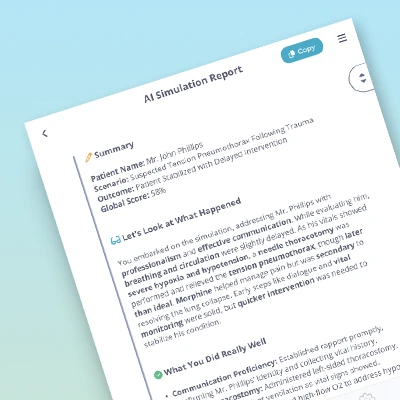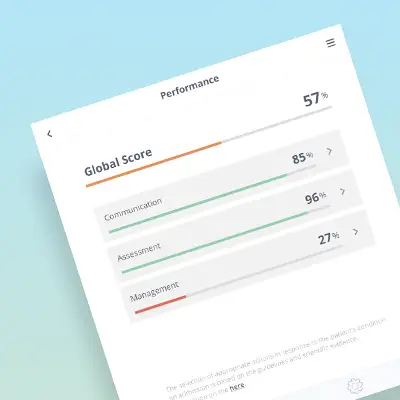SIMex 2023
The Seventh International Meeting on Clinical Simulation, SIMex 2023, entitled: “Clinical Simulation: Strengthening the Present for the Professional Future” was recently held and many relevant talks, activities and workshops took place. Following the preview article, we would like to highlight the online presentation provided by Professor H. Ösp Egilsdottir.
Professor H.Ösp Egilsdottir RN, MSN and PhD candidate, Program Coordinator for Flexible Decentralized Nursing Education at the University of South-Eastern Norway, gave the keynote entitled: “Importance of debriefing in virtual simulation: A look at educational practices related to virtual simulation in Norway”.
Professor Egilsdottir started by presenting the nursing curriculum in Norway, the challenges she faces due to her geographic location, and the changes brought about by the COVID-19 pandemic in students’ clinical practices.
She presented the relevance of the use of virtual patients in different topics of nursing education, where thematics such as fundamental nursing care, human bioscience, communication, ethics, understanding of documentation and interdisciplinary collaboration, among others, stand out.
-
Application of Virtual Patients in different settings:
Professor Egilsdotttir provided examples of educational scenarios to use virtual patients, for which she commented that they can be applied in large or medium groups in the classroom, small groups in the simulation centre using a projection screen or a touch screen with a user, online using zoom or an equivalent tool, individual use by students on their own computers or access devices, and finally, with small groups around the simulation table.
-
Implementation of mixed simulation techniques:
Professor Egilsdottir reflected on how, at the University of South-Eastern Norway, they redesigned the courses to incorporate mixed simulation techniques, particularly incorporating Virtual Patients. One of the central points is the academic structure of the virtual simulation sessions, where everything starts from a pedagogical approach, a series of activities prior to the simulation session, the execution of the simulation with the virtual patient, and finally, the learning outcomes.
One of the main points that Professor Egilsdottir raised was that the focus was not on solving or completing the virtual patient scenarios, but on the interaction of the facilitator in stopping and pausing the virtual patient scenario for analysis, using Socratic communication, and the “Human in the loop” concept that adds value to achieve learning outcomes in virtual simulation.
She explored the concept of debriefing, for which she highlighted aspects such as continuous discussion and reflection among the participants, the exploration of cognitive thought processes and reasoning to strengthen professional knowledge, understanding the clinical signs to act accordingly and promote the safety of the patient and quality care. Likewise, she talked about critical thinking and awareness of one’s own clinical practices to arrive at a reflective debriefing.
The facilitators are crucial in establishing a safe learning environment for reflective debriefing, as they must explain the rules of the simulation environment, clarify the different roles in the simulation, recognize the vulnerability of students, properly manage communication, and finally, adjust reasoning processes.

-
Teaching a decentralized intervention radiology course:
Professor Egilsdottir presented a very interesting example of how they are teaching the decentralized interventional radiology course flexibly, through virtual patient observation. We highlight the structure of the course which begins with a theory seminar on patient observation. Subsequently, a set of group virtual simulation cycles using Zoom and virtual simulation practices in Body Interact, individually. Finally, they close with a virtual simulation oral exam.
Professor Egilsdottir concluded with the experiences in reflective debriefing, commenting that the participation of students in the debriefing process increased. Likewise, a greater development of clinical reasoning and critical thinking skills was observed. Also, a greater opening to give constructive feedback to colleagues. Finally, the experience in the use of the virtual patient as a basis for the oral examination was successful.
Professor Egilsdottir shared additional bibliography with the audience:
- Egilsdottir, H.Ö., Heyn, L.G., Brembo, E.A., Byermoen, K.R., Moen, A. & Eide. H. (2021). Configuration of mobile learning tools to support basic physical assessment in nursing education: A longitudinal participatory design approach. JMIR Mhealthand Uhealth, 9 (1).
- Flo, J., Byermoen, K.R., Egilsdottir, H.Ö., Eide. H. & Heyn. L.G. (2021). Nursing students’ experiences of virtual simulation when using a video conferencing system: A mixed methods study. International Journal of Nursing Educational Scholarship.18 (1).
- Egilsdottir, H.Ö., Heyn, L.G., Brembo, E.A., Byermoen, K.R., Moen, A. & Eide. H. (2022). The value of redesign of clinical rotation course during COVID-19 pandemic: A Convergent mixed method study. BMC Nursing.
- Mestre, A., Muster, M., El Adib, RA.R., Egilsdottir, H.Ö., Byermoen, K.R., Padilha, M., Aguilar, T., Tabagari, N., Betts, L., Sales, L., Garcia, P., Ling, L., Café, H., Binnie, A. & Marreiros, A. (2022). The impact of small-group virtual patient simulator training on perceptions of individual learning process and curricular integration: A multi-centrecohort study nursing and medical students. BMC Medical Education.
- Heyn, L.G., Brembo, E.A., Byermoen, K.R., Flo. J., Overgaard, G., Nordsteien, A., Eide, H. & Egilsdottir, H.Ö. (under review). The focus of the facilitation and debriefing in virtual simulation: A scoping review. PEC Innovation.
- Van der Vloed, M., Eide, H., Gladhus, L., Byermoen, K.R., Egilsdottir, H.Ö. & Heyn, L.G. (under review). Exploring dialogue in virtual simulation in nursing education –an observational study. PEC Innovation
By: Francisco Camargo, PhD









